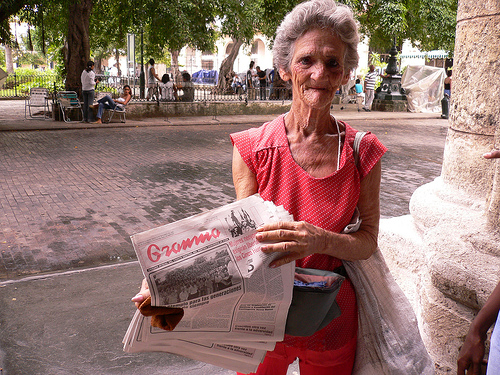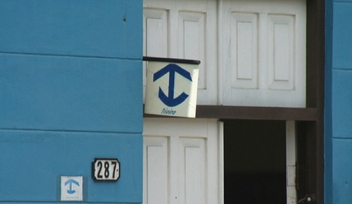
My mother just closed the business that fed the better part of my family in Cuba over the last decade. The reason: the country’s new plan of economic recovery.
A little over ten years ago, someone who shares my blood and who had an immense business vision, became a pioneer in a particular business: Renting to foreigners. She started in 2000, in the tiny provincial town where we live, accompanied by barely a couple of reckless people, in the new enterprise of allocating part of her house to accommodate tourists.
Born at that time, striving, beset by doubts, was what then would be the most “ambitious” of the private businesses in socialist Cuba: renting in foreign currency.
Timid reforms at first, then significant investments, an ever-growing number of Cuba households deforming their square feet to cram their members in like contortionists, and reserving one or two rooms for the gentlemen with pink cheeks to spend their nights in.
In the beginning the State was cautious. It allowed economic activity reluctantly, like one accepts the inevitable: like it accepted the circulation of the dollar only to veto it later. But it allowed it.
In order to be an altruistic benefactor? Out of a desire to elevate the standard of living of its citizens? Not so much.
If they turned a blind eye at first, if they legalized the activity after the fact, it was for reasons of elementary logic: the sugar industry had been demolished and tourism emerged as the savior of the Cuban economy. But where to host the growing number of the curious who looked to the island, the pry into the Jurassic relic of a Bolshevik state in the 21st Century? In what hotels? In what infrastructure?
The inventive salvation of the starving was the solution: if they want to rent their homes, fine, let them do it. Earning a few pesos in hard currency. Sleeping with less space. And let them deliver a big chunk of gold later.
The initial amount of monthly taxes seemed disproportionate to landlords: $ 100 per active room. They were unaware that even that number would grow over time to much, much more.

Because the always well-informed inspectors from Housing–the governing body of the activity–responsible for keeping a vigil over their martyrdom, because the iron rules in these home-businesses would be met, learned something unexpected: the homeowners were preparing breakfasts, cooking Creole dinners for their guests, and pocketing five, seven, ten dollars more than usual.
After a lot of meetings and deliberations, the Olympian bureaucracy spoke: Whoever chooses to offer food must officially declare it. And pay for it 30 CUC a month more into the treasury. (The era of convertible pesos, those funny little notes in color, had been born).
Nobody in their right mind declared it. With the abusive and monthly sum of 100 CUC per room, whether or not they had any customers, whether or not they had any income, no one wanted to pay one cent more. In the interiors of their houses, with the shutters closed, with the caution of the criminal, enterprising Cubans were preparing orange juice, tortillas with cheese, toast; they cooked their lamb stew and their fried plantains.
Measure, countermeasure and response: a short time elapsed until the new decree: whether or not they offered food, all homeowners renting rooms would pay 130 CUC monthly per room to the state. And problem solved.
Thus passed a few years. Some furnished and air-conditioned two rooms knowing they had to take in 260 CUC just to maintain their license, and many times it was the work of faith and charity. In boom months, especially at the ends of the year when tourists from half the world take refuge from the snow on a tropical island, the profits could allow them to pay that sum and enjoy some income. And above all: to save money for the coming months when not a single “Charlie” would knock at the door.
But, again, the map of the country moved. The naive joy of some music served to celebrate the decision: the General-cum-President, with power firmly in his own hands, discovered that the country couldn’t take it any more — with the same clairvoyance that he’d discovered a year earlier that the marabou weed had taken over Cuba’s farmland — and that he had to reform the national economy.
Meetings and discussions, proposals and refusals, Granma newspaper articles and entertaining Roundtable TV shows, speeches, briefs, reports and memos: with the parsimony of the big decisions, one fine day they informed expectant Cubans that the economy finally would shake off the rust. Finally private activities would not be stigmatized, banned or reluctantly tolerated.
Economic revitalization–Cuba and its eternal euphemisms!– was on the march.
I remember a suspicious first incident that I heard about by chance: next to me, a country barber was telling his interlocutor that very soon he would be handing in the license for his “business.” Cutting hair in the remote community of Mabay–where a tarnished plaque recalls that the first soviet in America was built there–had become unviable since he had to pay a tax of 200 pesos a month.
Before me was the first victim of the experiment: the economic revitalization, which would put the State barber shops into private hands, had just raised, astronomically, the cost of the license for a barber who could, at most, charge two or three pesos for each haircut.
And like a raging avalanche, before which taxi drivers are swept away, before which exhausted workers lose their jobs, the Cuban State implemented its economic recovery with notable efforts: raising the taxes on every economic activity by which Cubans maintained their poverty level standard of living. And the worst of the worst: imposing taxes on activities that had always been exercised without paying any taxes on them.
Neither the palm tree toppers, nor the scissor sharpeners, nor the grass cutters, would be exempt from the joyous revival.
So my mother, with the pain of closing something of a tradition; with a vague nostalgia for the days when a family member who is no longer with us founded his small but successful business, just turned in the authorization to be allowed to rent two rooms to regular customers after a decade in business.
When the impossible and shameless figure of 200 convertible pesos per room reached the ears of the shorn landlords, they thought it was a joke in bad taste. Later they understood.
The think tanks did not assume that the time had come to alleviate the hardship and deprivation of its citizens. The government measures to encourage investment, were the horrifying mechanisms implemented by an abusive State to more effectively empty the pockets of its squalid servants.
May 19 2011
